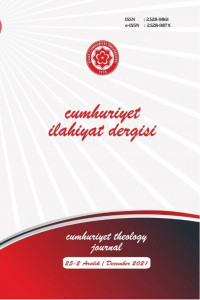Göçtü Kervan: Türk Tasavvuf Şiirinde Kervan İstiaresi
The Caravan Has Passed: The Metaphor (Majāz) of the Caravan in Turkish Ṣūfī Poetry
Author(s): Gülay KaramanSubject(s): Theology and Religion, Islam studies, Turkish Literature
Published by: Cumhuriyet Üniversitesi İlahyat Fakültesi
Keywords: Turkish Islamic Literature; Turkish Ṣūfī Poetry; Ṣūfīsm (Taṣawwuf); Caravan; Metaphor (Majāz) of the Caravan;
Summary/Abstract: Through the influence of the religious mystical thought, which interprets the human as a traveler and the world as a destination to settle in and migrate from, numerous connotations as to the road, the passenger as well as the journey have been created in Turkish Ṣūfī poetry. The caravan, which takes place in poetry as an element of simile (tashbīḥ) and generally within the framework of metaphor (majāz) is one of these associations. In Ṣūfī texts, the caravan symbolizes the spiritual journey of the sālik, who wants to reach the rank (maqām) of the Perfect Human Being in the footsteps of the leading figures of the religion and Ṣūfīsm (Taṣawwuf). The caravan has passed, which is understood as a symbol peculiar to the lore language, looks like a formula of a series of advice that reminds and warns people of the responsibilities they are obliged to fulfill even though life is short and the world is temporary. Being delayed of the unwary traveler when the caravan has passed was used in the sense that the sālik could not make use of his life, time, and opportunities; and the situation of the person who was left behind and separated from the caravan was generally met with the analogy of a lame donkey. In this study, which is about the caravan as a mystical metaphor (majāz), the survey model, one of the qualitative research methods, was used. The research aims to determine the use of the caravan metaphor (majāz) in the examples of Ṣūfī poetry and meanings it has gained in Ṣūfī terminology. For this purpose, the major works written between the 12th and 19th centuries in Turkish Ṣūfī poetry have been investigated, and the data obtained have been evaluated in the light of the works and views of the leading figures who have been influential on Turkish Ṣūfī culture and literature. The study, which is thought to contribute to the understanding of the metaphors (majāzs) that Turkish Ṣūfī poetry is based on is important since it reveals that the usages the caravan has passed is one of the common symbols of Ṣūfīsm (Taṣawwuf). As a result of the research, it was found out that the metaphor (majāz) of the caravan has existed in poetry uninterruptedly since the 12th century when Turkish Ṣūfī literature began to take shape. Although time, place, and persons change, the meanings attributed to the metaphor (majāz) of the caravan are almost the same. Especially in the poems containing advice, the metaphor (majāz) of the caravan was frequently used to guide people and human life was associated with the caravan. In this respect, it can be said that the metaphor (majāz) of the caravan has a traditional usage in Turkish Ṣūfī poetry. On the other hand, the usage of the caravan metaphor (majāz) in Turkish Ṣūfī poetry and the usage in Iranian literature show similarity. As a matter of fact, starting with Aḥmed Yesevī (d. 562/1166), many Ṣūfī poets depicted the same journey in a similar way, and Saʿdī-i Shīrāzī (d. 691/1292) dealt with the same theme in a way that coincided with the narrative and vocabulary of Turkish poets. The fact that the caravan is determined with similar uses in the poems of different societies as a Ṣūfī symbol shows that the metaphor (majāz) of the caravan has a common usage regarding Ṣūfīsm (Taṣawwuf) in the wide cultural geography of Islam. The metaphor (majāz) of the caravan has a special usage in Turkish Ṣūfī poetry in the form of the caravan has passed. Expressions in the style of the caravan has passed which succinctly fit a long adventure into two words, are symbols peculiar to the lore language, and serve as psychological advice in Turkish Ṣūfī poetry. On the one hand, this symbol deals with the caravan journey in the dimension of truth, on the other hand, it gives metaphorical meanings to the word, referring to the spiritual journey of sālik. In this sense, the caravan has passed is a powerful metaphor (majāz) that warns people to make the best use of the rest of their life, or rather the moment they are in, and it looks like a formula of a series of advice that warns them. The advice in question is closely related to the words die before you die and time is a sharp sword, often used by the leading figures of religion and mysticism. Therefore, the caravan has passed is a kind of contemplation and presents a vivid picture of the journey that takes its source from the social life so that the traveler does not forget that he is on the way by reminding him of death. The advice style is generally dominant in the poems in which the metaphor (majāz) of the caravan is used, especially in the poems describing the caravan’s passing and the heedless traveler staying on the road. However, it is obvious that the subject is presented in a lyrical and impressive style, especially in poets such as Aḥmed Yesevī, Yūnus Emre (d. 720/1320 [?]) and Niyāzī-i Mıṣrī (d. 1105/1694).
Journal: Cumhuriyet İlahiyat Dergisi
- Issue Year: 25/2021
- Issue No: 2
- Page Range: 797-822
- Page Count: 26
- Language: Turkish

